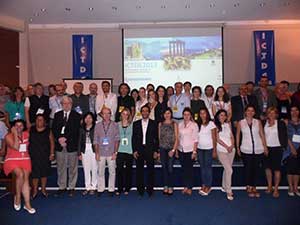
Conference photo with the participants
We had a great conference with over 240 participants from 38 countries on 25-28 September 2013 in Antalya, Turkey, one of the most spectacular part of the world. During the 3rd International Conference on Talent Development and Excellence we had the chance to meet lovely people, great scholars, to listen to excellent presentations, to visit historical places and to enjoy wonderful views and food. The conference was hosted by the Turkish Ministry of Education, the International Research Association for Talent Development and Excellence and the Turkish Association for the Education of Talented Children. The conference had a special focus on early potential and learning pathways for transforming early potential into adulthood excellence.
The five keynote speakers highlighted interesting and controversial issues in gifted education and introduced their own recent research results. K. Anders Ericsson, Conradi Eminent Scholar and Professor of Psychology at Florida State University, currently studies the measurement of expert performance in domains such as music, chess, nursing, law enforcement, and sports, and how expert performers attain their superior performance by acquiring complex cognitive mechanisms and physiological adaptations through extended deliberate practice. He proposed how findings and future research on talented children can be integrated in a general theoretical framework by collecting data on their detailed developmental and training histories along with concurrent assessments of the level and structure of performance in their respective domains.
Heidrun Stoeger, chair professor for Educational Sciences at the University of Regensburg, Germany introduced the topic of self-regulated learning, and presented the results of studies on average and gifted students. She described a number of training programs which are designed to be carried out by teachers as well as parents of gifted pupils. The talk concluded with newest research results on the influence of self-regulated learning on students´ learning behavior, performance and emotions and on the role of parents and teachers for optimal learning processes.
Sally Reis, Teaching Fellow in Educational Psychology at the University of Connecticut, Principal Investigator of The National Research Center on the Gifted and Talented highlighted what theories and pedagogy have a particular relevance to students with the highest potential for fulfilling the leadership roles that will be played by gifted young people, by redefining the role of gifted education for the 21st century. The video-presentation dealt with the many new challenges that face the education systems as they examine the policies and pedagogy that guide programs for the gifted. The presentation called attention to some of the new directions that will be required in the assessment of human potential, the motivational and self-directed learning skills that promote maximum performance, the technological skills required by both students and teachers, and the “intelligences” outside the normal curve that should be part of the curriculum for gifted young people.
Roza Leikin, professor at the Department of Mathematics Education, the Head of the Post-graduate Program in the Education of Gifted at the Faculty of Education, University of Haifa, spoke about the relationship between mathematical creativity and giftedness. She payed special attention to the relationships between mathematical creativity, high achievements in school mathematics and mathematical giftedness, and discussed these relationships using examples from multidimensional examination of mathematical giftedness. Emphasis was made to the special ability of mathematically gifted students to generate insight-based solutions for mathematical problems, and educational implications of the research findings were also devised and discussed.
Seokhee Cho, Associate Professor, School of Education at St. John’s University in New York had a presentation about the family processes that may facilitate talent development in science, technology, engineering and mathematics. Based on the Munich Dynamic Ability Achievement Model, predictive relationships between family processes and science talent development were examined with various age groups of Korean scientifically talented students and general education students. Especially, fathers’ involvement in children’s education was found to be critical for talent development in math and science. She emphasized that parents need to become aware of their impact on children’s talent development.
In a panel discussion we had the chance to listen to four of the keynote speakers sharing their views about the definition of giftedness, implementation of gifted education and the best time for gifted education to start.
In addition to the keynote lectures, more than 150 presentations were displayed in 24 English-language, 14 Turkish-language oral sessions and a poster session, with a special emphasis on the topics of self-regulated learning, creativity, learning and development, identification, personality, enrichment, culture, acceleration, counseling, curriculum, intelligence and theoretical models.
After this fruitful event, the International Research Association for Talent Development and Excellence is planning to organize its future conferences in 2014 in Peru and in 2015, in Brisbane, Australia.